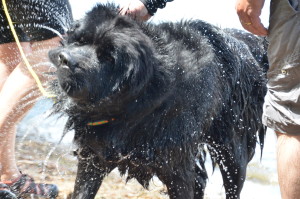Where to find a Newfoundland Dog?*
If you are reading this, you are most probably interested in finding a Newfoundland dog. There are a multitude of ways to get a Newfoundland; from a breeder, your local shelter or rescue organization, a newspaper advertisement, or a friend of a friend. All of those Newfoundlands need homes, but I would ask you to stop and think through this decision BEFORE you just have to have that puppy or take the pitiful rescue home from the shelter.

Newfoundlands are not for everyone.
The breed has many admirable qualities. One of the most or least attractive is their drooling. Some Newfie owners brag about the size of their dog’s drool strings, its stickiness, or the distance it was flung and where it ended up. You may have heard that there are “wet mouth” and “dry mouth” Newfoundlands.  That is a sales claim designed to sell your spouse a dog. All Newfoundlands drool. Their jowls or lower lips collect saliva like a basin and it runs out as drool. When they shake their head, the drool flies and lands and sticks to everything. If you live with a Newfoundland, you will end up with drool stuck to the walls, your hair, clothes and possibly hanging from the ceiling. It does come out in the wash.
That is a sales claim designed to sell your spouse a dog. All Newfoundlands drool. Their jowls or lower lips collect saliva like a basin and it runs out as drool. When they shake their head, the drool flies and lands and sticks to everything. If you live with a Newfoundland, you will end up with drool stuck to the walls, your hair, clothes and possibly hanging from the ceiling. It does come out in the wash.
The second most admirable trait, is their double coat that is designed to protect them in the freezing waters of the North Atlantic. It falls out regularly. A Newfoundland needs to be groomed regularly, weekly or more often if possible. The more you comb & brush, the less hair you will find floating into a dinner meal or gathered in tufts stuck to the carpet or rolling around the floor.  Some owners with multiple Newfs go through a vacuum cleaner every year or so. If you don’t/can’t groom your dog yourself, you can expect to spend between $80 and $150 to have a Newfoundland combed out, bathed and dried.
Some owners with multiple Newfs go through a vacuum cleaner every year or so. If you don’t/can’t groom your dog yourself, you can expect to spend between $80 and $150 to have a Newfoundland combed out, bathed and dried.
The Newfoundland’s thick coat and his love of playing in water and mud combine to make him a highly efficient transporter of dirt into your home, depositing same on your floors and rugs and possibly also on your furniture and clothes.One Newfoundland coming in from a few minutes outdoors on a rainy day can turn an immaculate house into an instant hog wallow. His lips hold onto water every time he takes a drink, then releases same drippingly across your floor or soppingly into your lap.  I don’t mean to imply that you must be a slob or slattern to live happily with a Newf, but you do have to have the attitude that your dog’s company means more to you than does neatness and you do have to be comfortable with a less than immaculate house. While all dogs, like all children, create a greater or lesser degree of household mess, almost all other breeds of dog (except the Old English Sheepdog) are less troublesome than the Newfoundland in this respect. If you are a fanatic about a clean house, cats are cleaner, and goldfish hardly ever mess up the house.
I don’t mean to imply that you must be a slob or slattern to live happily with a Newf, but you do have to have the attitude that your dog’s company means more to you than does neatness and you do have to be comfortable with a less than immaculate house. While all dogs, like all children, create a greater or lesser degree of household mess, almost all other breeds of dog (except the Old English Sheepdog) are less troublesome than the Newfoundland in this respect. If you are a fanatic about a clean house, cats are cleaner, and goldfish hardly ever mess up the house.
DON’T BUY A NEWFOUNDLAND IF YOU ARE UNWILLING TO SHARE YOUR HOUSE AND YOUR LIFE WITH YOUR DOG.
Newfoundlands thrive on companionship and they want to be wherever you are. They are happiest living with you in your house and going with you when you go out. While they usually tolerate being left at home by themselves (preferably with a dog-door giving access to the fenced yard), they should not be relegated to the backyard or kennel. A puppy exiled from the house is likely to grow up to be unsociable, (fearful and/or unprovokedly aggressive),unruly, and unhappy. He may well develop pastimes, such as digging or barking, that will displease you and/or your neighbors. An adult so exiled will be miserable too. If you don’t strongly prefer to have your dog’s companionship as much as possible, enjoying having him sleep in your bedroom at night and sharing many of your activities by day, you should choose a breed less oriented to human companionship. Likewise if your job or other obligations prevent you from spending much time with your dog. No dog is really happy without companionship but the pack hounds are more tolerant of being kenneled or yarded so long as it is in groups of 2 or more. A better choice would be a cat, as they are solitary by nature.
DON’T BUY A NEWFOUNDLAND IF YOU DON’T INTEND TO EDUCATE (TRAIN) YOUR DOG.
Newfoundlands are known as the “Gentle Giants” of the dog world. This does not mean that they don’t need training. Basic obedience and household rules training is NOT optional for the Newfoundland. As an absolute minimum, you must teach him to reliably respond to commands to come, to lie down, to stay, and to walk at your side, on or off leash and regardless of temptations. You must also teach him to respect your household rules: e.g. is he allowed to get on the furniture? is he allowed to beg at the table? What you allow or forbid is unimportant; but it is *critical* that you, not the dog, make these choices and that you enforce your rules consistently. You must commit yourself to attending an 8 to 10 week series of weekly lessons at a local obedience club or professional trainer and to doing one or two short (5 to 20 minutes) homework sessions per day. As commands are learned, they must be integrated into your daily life by being used whenever appropriate and enforced consistently. Young Newfoundland puppies are relatively easy to train: they are eager to please, intelligent, and calm-natured, with a relatively good attention span. Once a Newfoundland has learned something, he tends to retain it well. Your cute, sweet little Newfoundland puppy will grow up to be a large, powerful dog. If he has grown up respecting you and your rules, then all his physical and mental strength will work for you. But if he has grown up without rules and guidance from you, surely he will make his own rules and his physical and mental powers will often act in opposition to your needs and desires. For example: he may tow you down the street as if competing in a sled-dog race; he may grab food off the table; he may forbid your guests entry to his home.
This training cannot be delegated to someone else, e.g. by sending the dog away to “boarding school”, because the relationship of respect and obedience is personal between the dog and the individual who does the training. This is true of all dogs to greater or lesser degree, but definitely to a very great degree in Newfoundlands. While you definitely many want the help of an experienced trainer to teach you how to train your dog, you yourself must actually train your Newfoundland. As each lesson is well learned, then the rest of the household (except young children) must also work with the dog, insisting he obey them as well. Many of the Newfoundlands that are rescued from Pounds and Shelters show clearly that they have received little or no basic training, neither in obedience nor in household deportment; yet these same dogs respond well to such training by the rescuer or the adopter. It seems likely that a failure to train the dog is a significant cause of Newfoundland abandonment. If you don’t intend to educate your dog, preferably during puppyhood, you would be better off with a breed that is both small and socially submissive, e.g. a Shetland Sheepdog. Such a dog does require training, but a little bit goes further than with a Newfie. In the opposite direction, if your goals in obedience training are oriented towards success at high level competition (HIT, OTCh, etc.), please realize that the Newfie is not among the half dozen breeds best suited to such highly polished performance. (Newfies can, with adequate training, excel at such working competitions as carting, tracking, water rescue.)
Newfoundland dogs are a giant breed that although relatively healthy, need regular veterinary care as well as food and daily exercise. Giant breeds need more of everything. A visit to the veterinarian will cost almost double the bill for a smaller dog. By taking a Newfoundland into your home, you are accepting responsibility for a loving, caring animal that will be dependent upon you for his welfare.
OK, you have read this far and you are still interested. The more information you have about the Newfoundland breed and how to select a puppy or dog will help you make a better decision about whether a Newfoundland will fit into your life.
You will find a wealth of information regarding the breed at the website of the Newfoundland Club of America:
You can also find more information on the pages of the other Regional Newfoundland dog clubs listed HERE:
If you think that an older dog might better fit your situation, we would encourage you to visit our page for Rescue
If you feel that a puppy is what is right for you, we would encourage you to visit our page for Breeders
* Based on the article “Don’t Buy a Bouvier” by Pam Green (copyright 1992, 2007). Used with permission.
